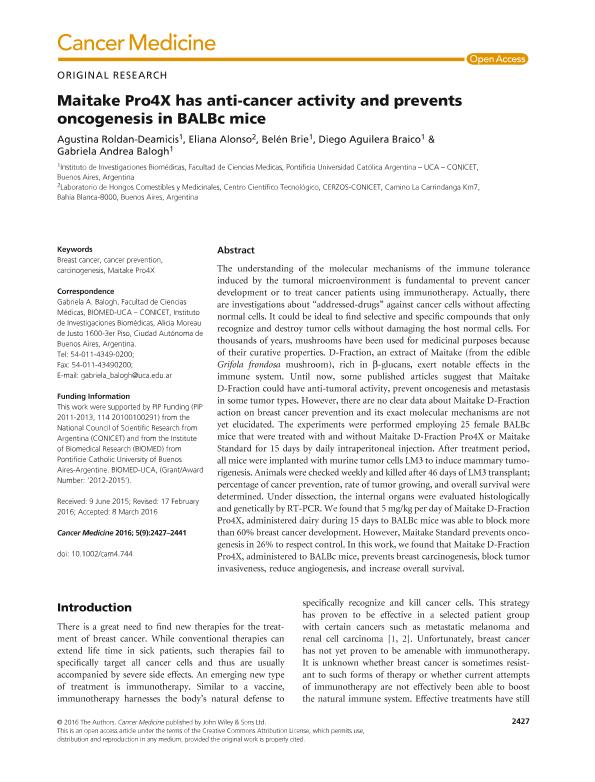Mostrar el registro sencillo del ítem
dc.contributor.author
Roldán Deamicis, Agustina

dc.contributor.author
Alonso, Eliana Noelia

dc.contributor.author
Brie, Belen

dc.contributor.author
Aguilera Braico, Diego Máximo

dc.contributor.author
Balogh, Gabriela Andrea

dc.date.available
2018-03-23T18:51:59Z
dc.date.issued
2016-09
dc.identifier.citation
Roldán Deamicis, Agustina; Alonso, Eliana Noelia; Brie, Belen; Aguilera Braico, Diego Máximo; Balogh, Gabriela Andrea; Maitake Pro4X has anti-cancer activity and prevents oncogenesis in BALBc mice; Blackwell Publishing Ltd; Cancer Medicine; 5; 9; 9-2016; 2427-2441
dc.identifier.issn
2045-7634
dc.identifier.uri
http://hdl.handle.net/11336/39834
dc.description.abstract
The understanding of the molecular mechanisms of the immune tolerance induced by the tumoral microenvironment is fundamental to prevent cancer development or to treat cancer patients using immunotherapy. Actually, there are investigations about "addressed-drugs" against cancer cells without affecting normal cells. It could be ideal to find selective and specific compounds that only recognize and destroy tumor cells without damaging the host normal cells. For thousands of years, mushrooms have been used for medicinal purposes because of their curative properties. D-Fraction, an extract of Maitake (from the edible Grifola frondosa mushroom), rich in β-glucans, exert notable effects in the immune system. Until now, some published articles suggest that Maitake D-Fraction could have anti-tumoral activity, prevent oncogenesis and metastasis in some tumor types. However, there are no clear data about Maitake D-Fraction action on breast cancer prevention and its exact molecular mechanisms are not yet elucidated. The experiments were performed employing 25 female BALBc mice that were treated with and without Maitake D-Fraction Pro4X or Maitake Standard for 15 days by daily intraperitoneal injection. After treatment period, all mice were implanted with murine tumor cells LM3 to induce mammary tumorigenesis. Animals were checked weekly and killed after 46 days of LM3 transplant; percentage of cancer prevention, rate of tumor growing, and overall survival were determined. Under dissection, the internal organs were evaluated histologically and genetically by RT-PCR. We found that 5 mg/kg per day of Maitake D-Fraction Pro4X, administered dairy during 15 days to BALBc mice was able to block more than 60% breast cancer development. However, Maitake Standard prevents oncogenesis in 26% to respect control. In this work, we found that Maitake D-Fraction Pro4X, administered to BALBc mice, prevents breast carcinogenesis, block tumor invasiveness, reduce angiogenesis, and increase overall survival.
dc.format
application/pdf
dc.language.iso
eng
dc.publisher
Blackwell Publishing Ltd
dc.rights
info:eu-repo/semantics/openAccess
dc.rights.uri
https://creativecommons.org/licenses/by-nc-nd/2.5/ar/
dc.subject
Breast Cancer
dc.subject
Cancer Prevention
dc.subject
Carcinogenesis
dc.subject
Maitake Pro4x
dc.subject.classification
Bioquímica y Biología Molecular

dc.subject.classification
Medicina Básica

dc.subject.classification
CIENCIAS MÉDICAS Y DE LA SALUD

dc.title
Maitake Pro4X has anti-cancer activity and prevents oncogenesis in BALBc mice
dc.type
info:eu-repo/semantics/article
dc.type
info:ar-repo/semantics/artículo
dc.type
info:eu-repo/semantics/publishedVersion
dc.date.updated
2018-03-12T19:28:30Z
dc.journal.volume
5
dc.journal.number
9
dc.journal.pagination
2427-2441
dc.journal.pais
Estados Unidos

dc.journal.ciudad
Nueva York
dc.description.fil
Fil: Roldan Deamicis, Agustina. Pontificia Universidad Católica Argentina "Santa María de los Buenos Aires". Instituto de Investigaciones Biomédicas. Consejo Nacional de Investigaciones Científicas y Técnicas. Oficina de Coordinación Administrativa Houssay. Instituto de Investigaciones Biomédicas; Argentina
dc.description.fil
Fil: Alonso, Eliana Noelia. Consejo Nacional de Investigaciones Científicas y Técnicas. Centro Científico Tecnológico Conicet - Bahía Blanca. Centro de Recursos Naturales Renovables de la Zona Semiárida. Universidad Nacional del Sur. Centro de Recursos Naturales Renovables de la Zona Semiárida; Argentina
dc.description.fil
Fil: Brie, Belen. Pontificia Universidad Católica Argentina "Santa María de los Buenos Aires". Instituto de Investigaciones Biomédicas. Consejo Nacional de Investigaciones Científicas y Técnicas. Oficina de Coordinación Administrativa Houssay. Instituto de Investigaciones Biomédicas; Argentina
dc.description.fil
Fil: Aguilera Braico, Diego Máximo. Pontificia Universidad Católica Argentina "Santa María de los Buenos Aires". Instituto de Investigaciones Biomédicas. Consejo Nacional de Investigaciones Científicas y Técnicas. Oficina de Coordinación Administrativa Houssay. Instituto de Investigaciones Biomédicas; Argentina
dc.description.fil
Fil: Balogh, Gabriela Andrea. Pontificia Universidad Católica Argentina "Santa María de los Buenos Aires". Instituto de Investigaciones Biomédicas. Consejo Nacional de Investigaciones Científicas y Técnicas. Oficina de Coordinación Administrativa Houssay. Instituto de Investigaciones Biomédicas; Argentina
dc.journal.title
Cancer Medicine
dc.relation.alternativeid
info:eu-repo/semantics/altIdentifier/url/https://onlinelibrary.wiley.com/doi/abs/10.1002/cam4.744
dc.relation.alternativeid
info:eu-repo/semantics/altIdentifier/url/https://www.ncbi.nlm.nih.gov/pmc/articles/PMC5055164/
dc.relation.alternativeid
info:eu-repo/semantics/altIdentifier/doi/http://dx.doi.org/10.1002/cam4.744
Archivos asociados
